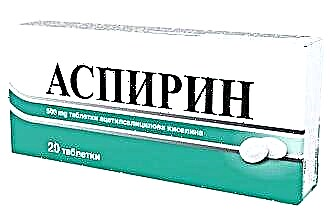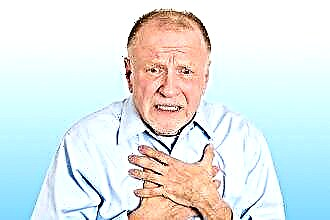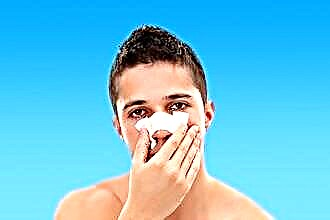A child's suffocating cough generally comes on unexpectedly. This symptom is very frightening for parents, and often they do not know how to help. There are many methods of emergency child care, and it is good for every parent to know about them. Cough is a symptom of allergies, respiratory diseases, including laryngitis, tracheitis and bronchitis, tonsillitis, lung abscess. Patients with heart failure, tuberculosis and cancer patients suffer from nocturnal coughs.
What is he talking about
 Small children have a special structure of the vocal cords, so bronchospasms are paroxysmal in nature until nausea or even vomiting. Very often, such a cough catches unexpectedly at night, and the patient needs emergency help.
Small children have a special structure of the vocal cords, so bronchospasms are paroxysmal in nature until nausea or even vomiting. Very often, such a cough catches unexpectedly at night, and the patient needs emergency help.
In some cases, a persistent cough may indicate a narrowing of the child's larynx and beginning laryngitis. This is an extremely dangerous phenomenon that can be fatal. Hospitalize the child immediately.
Investigate the timing and circumstances of the onset of the cough. If you notice symptoms appear as soon as your baby goes to bed, it could be an allergy. An irritant can be a pillow, a feather or sheepskin blanket, mattress or couch padding, synthetic bedding, synthetic fabrics, or the laundry detergent you use. Allergen can be smell of varnish or fresh paint. When additional symptoms appear in the form of edema of the mucous membrane and tearfulness, the allergy is obvious.
SARS is the most common cause of cough in children, which worsens at night. In the supine position, mucus accumulates in the nasopharynx, dry air in the room irritates the mucous membrane, the nasal passages are blocked, so the baby is forced to breathe through the mouth. All these phenomena together provoke a cough during sleep. The child often coughs because the body is trying to remove phlegm.
 If the cough bothers the baby only or mainly at night, then bronchospasm can be a symptom of whooping cough, bronchial asthma, or be a reaction to the composition of the DPT vaccine. Whooping cough is characterized by a suffocating cough, even to the point of vomiting. The child blushes, the tongue protrudes, wheezing is heard when breathing. With bronchial asthma, coughing attacks begin in the morning, a whistling sound is heard when inhaling. The cough can be worse with sports. Such conditions are extremely dangerous, and specialist advice regarding treatment is required.
If the cough bothers the baby only or mainly at night, then bronchospasm can be a symptom of whooping cough, bronchial asthma, or be a reaction to the composition of the DPT vaccine. Whooping cough is characterized by a suffocating cough, even to the point of vomiting. The child blushes, the tongue protrudes, wheezing is heard when breathing. With bronchial asthma, coughing attacks begin in the morning, a whistling sound is heard when inhaling. The cough can be worse with sports. Such conditions are extremely dangerous, and specialist advice regarding treatment is required.
Gastroesophageal reflux also occurs with a suffocating cough that occurs at night. A coughing child may be suffering from heartburn.
It happens that the cough is not associated with the above diseases and is the result of the ingestion of some small part of the toy into the respiratory tract. Carefully examine the child's mouth and take steps to remove the foreign object.
In infants, bronchospasm sometimes accompanies cutting teeth due to profuse salivation. It is recommended to lay the baby on its side and place the baby's head higher.
Types and duration
Dry cough is divided into physiological and pathological. The first type of bronchospasm is a natural reaction to mechanical or chemical irritation of the mucous membrane. A pathological cough implies disruption of the respiratory system and the development of an inflammatory process.
 Based on the duration and nature of bronchospasm, cough is subdivided into:
Based on the duration and nature of bronchospasm, cough is subdivided into:
- Spicy. The cough is long-lasting, disturbs for several hours in a row and is a symptom of acute respiratory viral infections.
- Protracted. It persists for more than 10 days, often indicates complications after viral infections. Such a cough does not go away on its own and requires complex treatment.
- Recurrent. Reappears after 4-5 weeks. Often it has a paroxysmal character and is inherent in bronchitis or bronchial asthma.
- Chronic. Persistent cough requiring a complete medical examination.
For any type of cough, a specialist consultation is required before treatment. This will help to identify the exact cause of the cough, prescribe competent timely therapy and prevent the development of complications.
Choking dry cough in a child - what to do
With a suffocating cough, the baby can be helped by:
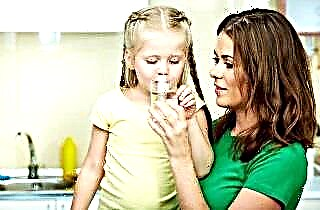 real bee honey;
real bee honey;- alkaline drink;
- fatty butter (82.5%);
- pharmacy children's cough syrup;
- inhalation.
If the baby starts coughing while sleeping, the baby should be immediately awakened and given water. Mineral water, milk or herbal decoction will do. The drink should be warm, it will help soften the mucous membrane, reduce tickling and ease the attack. Butter and honey are given in small quantities for slow absorption. Honey can be treated if the baby is not allergic to bee products, otherwise he will get worse.
Foods containing vitamin C, such as red currants, are suitable as emergency medications. Their action is to dilute sputum and transform dry cough into wet one.
Inhalation has an excellent moisturizing effect. Hot vapors penetrate deep into the respiratory system, reducing spasms. Pharmacy children's syrups often contain essential oils and can also serve as an ambulance for a sudden cough.
Warming up the respiratory organs with the help of various compresses, cakes and mustard plasters will help in liquefying phlegm and removing it from the body.
A humidifier and improvised means in the form of damp clothes or containers of water will be effective against coughs with dry air in the room.
Popular folk methods
There are many ways in traditional medicine to stop a suffocating cough. After drinking a warm drink, you can ask your child to walk around. During the massage, it is worth doing light slaps on the back so that the mucus goes away.
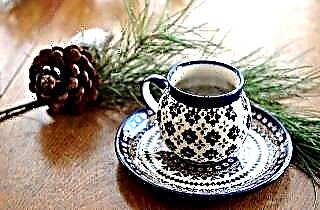 Herbal teas can be mixed with milk, for example, take milk with sage. This remedy has a good effect on a lingering cough.
Herbal teas can be mixed with milk, for example, take milk with sage. This remedy has a good effect on a lingering cough.- Coniferous decoctions or plants with essential oils (sage, cedar) are excellent for inhalation. If these are not at hand, then even ordinary hot water with baking soda will help to calm the cough a little.
- Good for bronchospasm black radish syrup. You can bake the radish with sugar, or use the juice as a syrup. To do this, you need to make a pot of radish, cut out the middle from the root crop, and fill it with honey, leaving room for the juice. After a while, the radish will release liquid and the syrup will be ready. If the baby categorically refuses to drink it, rub it on the back and chest of the patient.
- Paraffin is widely used for external heating of the respiratory system. It is very important to monitor its temperature when melting so as not to burn the baby's skin.
Medicines from a doctor
 Pharmacy syrups are also an effective emergency aid, pharmacists will tell you a lot of cough remedies. One of the most effective medicines is licorice root. This natural remedy will help remove phlegm, will have a healing and disinfectant effect on the larynx, enveloping minor mechanical damage to the mucous membrane that appeared when coughing. However, the syrup contains sugar and is contraindicated in children with diabetes. When diluting the syrup, use only clean warm water, in no case boiling water, since the high temperature negatively affects the properties of the medicine.
Pharmacy syrups are also an effective emergency aid, pharmacists will tell you a lot of cough remedies. One of the most effective medicines is licorice root. This natural remedy will help remove phlegm, will have a healing and disinfectant effect on the larynx, enveloping minor mechanical damage to the mucous membrane that appeared when coughing. However, the syrup contains sugar and is contraindicated in children with diabetes. When diluting the syrup, use only clean warm water, in no case boiling water, since the high temperature negatively affects the properties of the medicine.
If none of the available remedies have an effect, call a doctor. Physicians may suggest hospitalization.You should not give it up: in some cases, coughing is a serious danger, provoking choking, pulmonary and laryngeal edema, which is called false croup. It can be fatal. Such suffocating attacks can only be relieved with specialist supervision. Doctors will provide emergency assistance, carry out inhalations using special equipment, etc.
Prophylaxis
There are some simple rules for dealing with coughs that every parent should know about.
- Always ventilate the room in which the child sleeps. Do wet cleaning indoors more often and humidify the air.
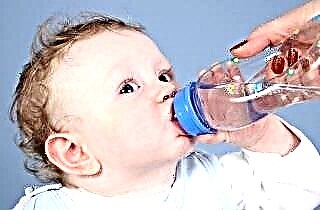 The baby should get enough fluids, especially during illness. Drinking can be varied with vitamin fruit drinks, teas and herbal decoctions. Be sure to flush your nose with saline.
The baby should get enough fluids, especially during illness. Drinking can be varied with vitamin fruit drinks, teas and herbal decoctions. Be sure to flush your nose with saline.- Inhalation is a very effective cough remedy, but remember that it should not be done on children under 6 months of age.
- It is forbidden to treat cough with antibiotics on your own. There are different medicines for the respective type of cough, so investigate the cough carefully.
- Do not give expectorants for dry cough and antitussives for sputum discharge, because their action is contrary to natural processes in the body.
- Take precautions when rubbing young children, change the position of the baby more often during sleep.
Remember that coughing is only a sign of the disease, but not the main problem, so you need to fight not with bronchospasm, but with the cause of its occurrence.
Thus, a suffocating cough can cause various illnesses. Treat coughs correctly and do not neglect the help of doctors if the situation is dangerous. With the right therapy, you can easily defeat the disease in its early stages.

 real bee honey;
real bee honey; Herbal teas can be mixed with milk, for example, take milk with sage. This remedy has a good effect on a lingering cough.
Herbal teas can be mixed with milk, for example, take milk with sage. This remedy has a good effect on a lingering cough. The baby should get enough fluids, especially during illness. Drinking can be varied with vitamin fruit drinks, teas and herbal decoctions. Be sure to flush your nose with saline.
The baby should get enough fluids, especially during illness. Drinking can be varied with vitamin fruit drinks, teas and herbal decoctions. Be sure to flush your nose with saline.